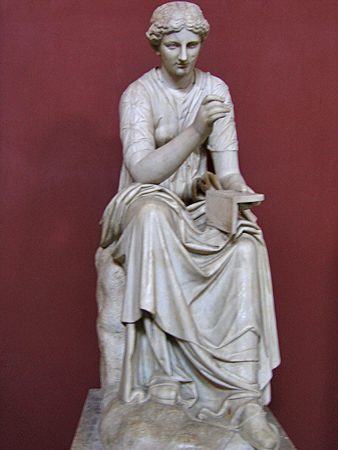
Calliope, Muse of Epic poetry, 2nd Century CE

The elegiac puellae, of whom we have tantalizing glimpses in Propertius' lament for his lost tabellae, tell us little about their intellectual capabilities and nothing of their lives. The "learning" the poem celebrates is his and that of his personified tablets, trained by him, not that of his love objects, for whom the tablets serve as go-betweens. Socially, the puellae fall outside the categories proper to adult women (matronae), but are they courtesans (meretrices) who are free to act as they please or are they wayward wives who have cleverly eluded their husbands and their matronal obligations? The tablets, much used by Propertius (in writing poetry? for assignations with his domina, as in Elegiae 3.16?) are personified as learned (doctae), precious (carae), faithful (fideles) and persuasive on his behalf (placare puellas). Like the poet they speak eloquently, like servants they are reliable and plain in appearance (wood frames with wax insets upon which his stylus impressed and erased words)— quite the opposite, we suspect, of his mistresses. Rather, it is their devotion to poetry and love which make the tablets worth the gold the poet offers for their return. Wondering what message was lost, he recalls former responses— only one out of four is positive. The imperious voices of his puella/e complain of his lateness, seek reassurance of their beauty, question whether he defames them, command his presence for a night of love. The poem preserves no verba diserta written by a docta puella (non stulta is a far cry from docta), only the smooth talk (blanditiae) of a garrula puella.The poem is written in elegiac couplet.
1 Ergo tam doctae nobis periere tabellae,
scripta quibus pariter tot periere bona!
has quondam nostris manibus detriverat usus,
qui non signatas iussit habere fidem.
5 illae iam sine me norant placare puellas,
et quaedam sine me verba diserta loqui.
non illas fixum caras effecerat aurum:
vulgari buxo sordida cera fuit.
qualescumque mihi semper mansere fideles.
10semper et effectus promeruere bonos.
forsitan haec illis fuerunt mandata tabellis:
'irascor, quoniam's, lente, moratus heri.
an tibi nescio quae visast formosior? an tu
non bona de nobis crimina ficta iacis?'
15 aut dixit: 'venies hodie, cessabimus una:
hospitium tota nocte paravit Amor,'
et quaecumque volens reperit non stulta puella
garrula, cum blandis dicitur hora dolis.
me miserum, his aliquis rationem scribit avarus
20et ponit duras inter ephemeridas!
quas si quis mihi rettulerit, donabitur auro:
quis pro divitiis ligna retenta velit?
Click on the underlined words for translation aids and commentary, which will appear in a small window. Click on the icon link
![]() to the right of the
poem for related images and information.
to the right of the
poem for related images and information.